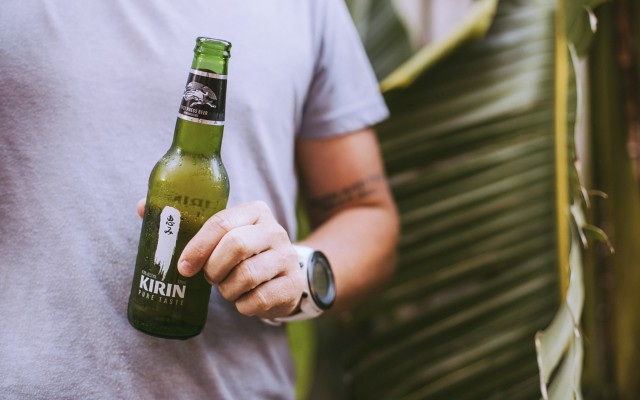Aussie beer is turning Japanese in a big way

Australia’s mass beer market is now dominated by Japanese brewers Asahi and Kirin.
It was way back in June 1980 the UK punk band the Vapors enjoyed their best chart performance anywhere in the world when their song Turning Japanese stayed on top of the Australian charts for two weeks.
And the successful song has turned out to be quite accurate, with Australia’s mass beer market now absolutely dominated by Japanese brewers Asahi and Kirin.
Asahi ready to pay monster bar tab of $16 billion
Asahi are proposing to pay $16 billion to buy Carlton & United Breweries from Anheuser-Busch InBev which would make their major competitor here and at home Kirin, which took over Australia’s second major brewery group Lion back in 2009.
Interestingly, Asahi at one stage back in the 1980s owned a stake in CUB via John Elliott’s ill-fated attempt to privatise his Elders IXL group so it has had Australian beer ambitions for very many years.
While that early attempt eventually failed, it did give the largest Japanese brewer a strong familiarity with CUB and its leading beer range and possibly the old saying that it would be hard to go broke selling beer to Australians.
Can you go broke selling beer to Australians?
It also witnessed a couple of Australian businessmen in the form of Alan Bond and John Elliott actually go broke selling beer to Australians (not to mention plenty of Americans and Poms) – although it was massive amounts of debts and regulatory attention that brought the two entrepreneurs to heel rather than any lack of Australian thirst.
After biding its time for a few decades, Asahi is now finally on the cusp of grabbing Australia’s biggest brewer in the form of CUB, which has a portfolio which includes Victoria Bitter, Carlton Draught, Melbourne Bitter, Pure Blonde, Carlton Draught, Wild Yak and Foster’s to name a few.

On the other side of the Australian beer aisle, Asahi’s largest rival and number two in Japan, Kirin, owns the Lion group which includes many other Australian and New Zealand mass market brews such as James Boag, Castlemaine XXXX, Emu Bitter, Hahn, James Squire, Little Creatures, White Rabbit, Southwark, Swan Draught, Tooheys, West End, Speight’s, Lion Red and Mac’s Craft Beers, to name a few.
What is Japan’s fascination for Aussie beer?
So why have Japan’s two biggest brewers found such a thirst for Australian beers that they paid what are widely conceded to be very full prices to get hold of them?
The answer lies back in Japan, which is a very challenging place to concentrate the future of all of your brewing assets, given that it has the dual problems of a rapidly ageing population and an incredibly low fertility rate.
Quite simply, marketing beer to thousands of 100-year-old pensioners is not an ideal future for any brewer, which is why both Asahi and Kirin have been busily buying a range of offshore brewers.
Asahi has bought Grolsch brewery, Italy’s Peroni brewery and the UK’s Meantime and Fuller’s breweries.
Kirin has been no slouch either, buying stakes in a host of international brewers including US brewers Brooklyn and Four Roses, Singapore’s Asia Pacific, the Philippine’s San Miguel, and Kirin outposts in China, Europe and the US.
Buying overseas breweries
The obvious benefit of diversifying internationally is that it generates profits in currencies other than Japan’s Yen and allows the brewers to access markets that are much younger and growing faster than Japan with bigger margins.
Having Japan as a home base also has the big advantage of providing a ready source of ultra-low-cost funds which make paying over the odds not as big a problem as it might be for other companies.
That is why Japan’s post office was able to pay an amazing $6.5 billion to buy Australian transport company Toll Holdings – a price that left other potential acquirer’s baffled and scratching their heads.
It turned out they had blown up a serious amount of money – around $5 billion – but the Japanese international raiders don’t mind putting some serious money on the bar to ensure that they are playing a very long game and get access to mature businesses that throw off plenty of cash.
Sometimes they might end up with a hangover but eventually they will be the last left standing at the bar.
